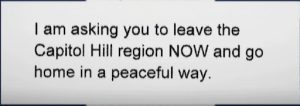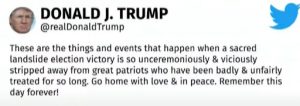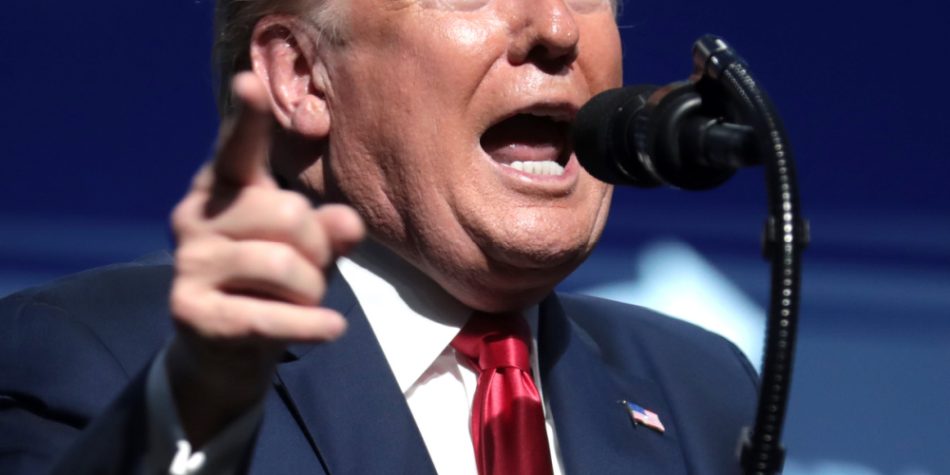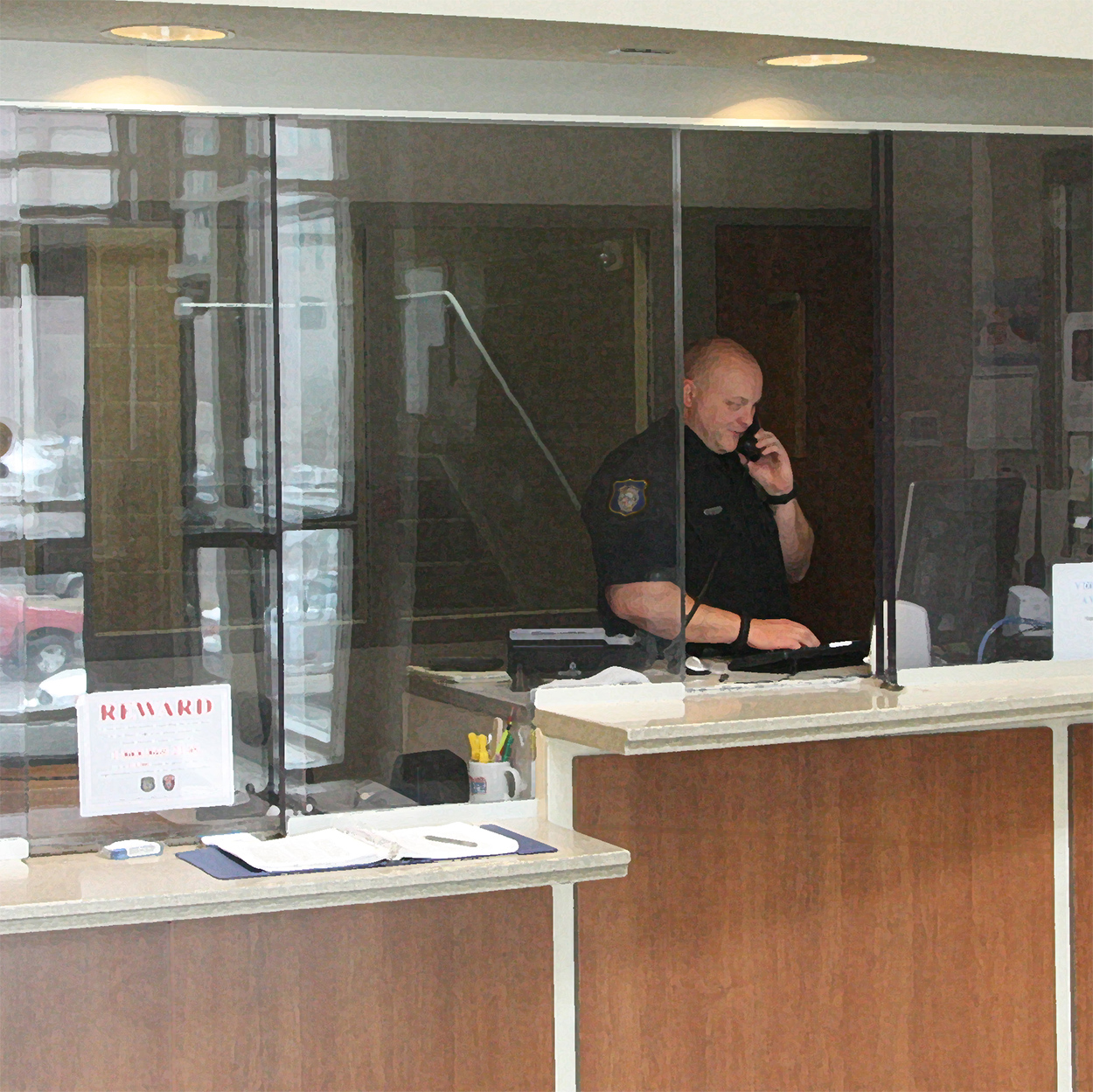I have watched every minute of the January 6th hearings, but it wasn’t going to be that way.
Right before the first one began, I had already decided not to watch it. I didn’t think I could tolerate another shrill, partisan attack from Democrats typified by the almost unbearable Kavanaugh confirmation hearings.
In David French’s article, This July Fourth, Meet Three Americas, he labels the three Americas “the red, the blue, and the tired.” That last descriptor fits me perfectly—firmly entrenched among “the tired.” I’m among the many who feel completely battered by both the far left and the far right. As French describes this large group, they represent:
The two-thirds of our neighbors and citizens (from across the political spectrum) who are fed up with polarization, forgotten in public discourse, flexible in their views, and still believe we can find common ground. … The exhausted American does not make a religion out of politics and is thus at a disadvantage when confronting the ferocity and zeal of the true political believer. The exhausted American is hungry for simple decency and will seek out friendships on the left and the right, so long as respect trumps differences. Even the most extreme disagreements are manageable so long as a friend is willing to listen and learn, and you’re willing to listen and learn in return.
That’s me. Yet my husband turned on the first January 6 hearing, and I walked into the room a few minutes in. I quickly realized that this was something entirely different than what I had expected. I was struck by the calm, measured establishment of facts discovered from interviews with some of the people closest to the former president. I realized I needed to give this a chance. I ended up watching it all.
Some who have refused to watch the hearings have called them a “political ploy” and a Democrat “hit job” and have debunked the value of the hearings because there has been no defense presented. The original proposal was for an explicitly bipartisan committee, but Senate Republicans blocked it by filibuster. As far as witnesses are concerned, those who would defend President Trump have either refused to testify or have taken the fifth when interviewed under oath. Still, virtually all of the witnesses have been Republicans.
Many of these sessions have honestly left me shaken and in tears after hearing details about the lives of honorable people that have either been destroyed or badly wounded. And I’ve learned a lot about the day I did not understand before. Yet, given the continued insistence that the hearings have simply been a partisan attack piece, many conservatives have simply ignored them. For those who didn’t have the time (or stomach or interest) to watch, I’d like to highlight 8 summary conclusions that feel are especially important for any of us to consider—each of them represents facts that, in my mind, are widely-supported enough to be broadly accepted even by conservatives:
1. Former President Trump kept rejecting an increasingly clear election outcome despite being advised to concede by some of his own official advisors. In hearing #1, we heard details about how White House officials informed the president that his claims of widespread voter fraud were false. Former Attorney General William Barr said, “I made it clear I did not agree with the idea of saying the election was stolen and putting out this stuff, which I told the president was B.S. … And I didn’t want to be a part of it.” Ivanka Trump testified under oath, “I respect Attorney General Barr, so I accepted what he was saying.”
In hearing #2, we also witnessed footage from under-oath interviews with Trump’s campaign manager, Bill Stepien, senior adviser Jason Miller, and multiple lawyers. All the witnesses were Republicans, and most were part of Trump’s inner circle. They all repeatedly tried to tell Trump the truth—that the outlook was bleak, he should not declare victory on election night, he was going to lose, and that his election fraud claims were “bogus and silly.”
Yet while multiple advisors and aides were trying to convince Trump that the stolen election idea was folly, other confidants were continuing to look for evidence that would reverse the election outcome. The former President consequently went down a rabbit hole of increasingly bizarre conspiracy theories. Bolstering Trump with these theories were Rudy Giuliani, lawyer Sidney Powell, John Eastman, and former trade adviser Peter Navarro.
Those with authority followed through with all due diligence to check up on all of Trump’s theories, which continued to lack corroborating evidence. None of these investigations found more than a few votes’ difference from the original counts. Eight prominent conservatives—including former federal judges, two former senators, and former Solicitor General Theodore Olson—recently released a detailed report that carefully examined each claim of fraud made in the wake of the election. They went through the legal challenges and noted that 34 were dismissed, in some cases voluntarily by Trump’s legal team, before they ever reached a hearing.
Despite all of this, thirty percent of Americans still believe that the 2020 election was stolen from Donald Trump. (Of course, concerns about fair elections go back many years, to Gore v. Bush and beyond; and there is a legitimate conversation we can have in this country about electoral integrity and security that involves different, thoughtful perspectives). In the weeks preceding the inauguration (and following it, too), there were additional efforts to block the new government from functioning, such as refusing to allow Biden to get the daily intelligence briefing. And remarkably, even last month (July 2022), Donald Trump himself has contacted officials in Wisconsin to try and reverse state-specific results.
2. The former President did not take quick or sufficient enough action to stop the unfolding events. There’s been lots of debate about security leading up to January 6 and the final protocol that day—including some suggestions that President Trump authorized more security ahead of time, which was declined by the D.C. mayor. In hearings #1 and 8, however, there was presented evidence to suggest that on January 6 itself, President Trump did not take adequate action to stop the January 6 melee.
The hearing presented never-before-seen footage of the attack, including from police cams, and it was a jarring experience to see the violence. Police officers attended the hearing, and many were in tears. There were 150 wounded, several so badly they haven’t yet been able to return to work. One officer described it as “a war scene” for which they had never been prepared. Yet as Liz Cheney noted, “Trump gave no order to deploy the National Guard that day and made no effort to work with the Department of Justice to coordinate and deploy law enforcement assets. But Mike Pence did each of those things.”
This most recent hearing #8 of the summer (commencing again in September) focused on the 187 minutes during which the attack on the capitol took place and what President Trump was doing during that time. Many members of his staff, outside parties, and even his family pleaded with him to do something, to tell people to disperse and leave. He chose not to act. After the Secret Service thwarted his desire to join the protest, he went to the dining room connected to the Oval Office, where he watched Fox News coverage for 2 hours.
In hearing #6, Cassidy Hutchinson reported overhearing a conversation that day between White House Counsel Pat Cipollone and chief-of-staff Mark Meadows: “I remember Pat saying to him, something to the effect of, ‘The rioters have gotten into the Capitol, Mark, we need to go down and see the President now.’ And Mark looked up [from his phone] and said, ‘He doesn’t want to do anything, Pat.’”
It was possible for Donald Trump at any time to go to the podium in the briefing room and give a forceful message that would dispel the riot. Sarah Matthews, Deputy Press Secretary to the President, who resigned the evening of the riots, testified that it would have taken President Trump 60 seconds to get there—with the press corps gathered in a matter of minutes. Yet the President delayed, with Pat Cipollone testifying that President Trump made no phone calls to anyone who might be able to quell the unrest at the Capitol. Trump didn’t speak with the attorney general, secretaries of defense, or homeland security that day. He was calling senators to push them to delay or end the electoral process at the capitol.
Leader McCarthy phoned the President to plead with him—saying his own staff was running for their lives. The President refused to do anything, saying yes, his supporters were pretty upset. Joe Biden joined the plea on TV.
The President finally relented and agreed to make a statement when the National Guard had been called by Mike Pence, and reinforcements were arriving. But he refused to read the script that had been written for him:

Instead, he toned down his condemnation of the events and mostly expressed his empathy and love for the people who had gathered and related that a singular event had happened—the election had been stolen from him and from them. His final tweet seemed to insinuate that January 6th had been not only a memorable day but a successful one.

3. Trump knew his supporters had weapons yet still encouraged them to go to the Capitol. In hearing #6, Cassidy Hutchinson spoke as a witness based on her role as an aide to former White House chief of staff Mark Meadows—her office was just feet from the President’s. She was present for many of the discussions leading up to January 6th and on the day itself.
Among other things, Hutchinson testified that Trump was informed that some of his supporters were in D.C. armed to the teeth. On the morning of Jan. 6, she said, Meadows and Trump were informed that Trump’s supporters came to his “Stop the Steal” rally armed with weapons—pepper spray, knives, brass knuckles, stun guns, body armor, gas masks, batons and blunt weapons, the committee detailed. The committee also played police calls reporting people with AR-15s. Hutchinson said Tony Ornato, the deputy chief of staff who served as a liaison for the Secret Service, told Meadows on the morning of Jan. 6, “something to the effect of ‘And these [expletive] people are fastening spears on top of flagpoles.’ ”
It’s true that President Trump said at the rally that if people were going to the Capitol, to do it “peacefully.” Yet he did not discourage people from going. Hutchinson testified as well that Trump knew members of the Proud Boys and Oath Keepers were armed—and shared details of how he wanted to join them specifically in their march to the capitol. Hutchinson provided second-hand reports of his anger at being kept from joining them.
4. Vice President Pence faced real danger, in large part due to the president. The third hearing focused on Vice President Mike Pence, who rioters were just 40 feet from at one point, many chanting “kill Mike Pence.” Yet Pence refused to evacuate with the Secret Service but stayed to finish the certification of the election.
In the final summer hearing #8, events were reviewed that minute by minute demonstrated the growing panic among security agents protecting Mike Pence, who thought things would quickly escalate to a life or death situation. As tensions ramped up, Trump tweeted that Mike Pence had betrayed them, further inflaming the crowd. “Pence didn’t have the courage to do what should have been done,” Trump tweeted, aware at the time that rioters had breached the Capitol. Matthew Pottinger, a decorated Marine intelligence officer and Deputy National Security Advisor to the President made the decision to resign at that moment.
The President wanted Pence to reject the electors or throw the election back to the states—intending to bring in a new slate of electors to cast electoral votes for him instead of for Joe Biden. But, of course, Pence did not have the constitutional power or authority to do what Trump expected him to do. Pence’s courage was in simply following the rules, which enraged some Trump supporters. In one video, one man was heard to say, “If Pence caved, we’re going to drag the [expletive] through the streets.” (Thus far, Pence has not testified, and Trump has never contacted him to apologize.)
Had Pence not rebuffed the pressure, the country would have been thrown into chaos. Such an act would have meant that after a free and fair election, the President could simply try to overturn it and hold onto power.
5. President Trump instigated over-the-top pressure and intimidation of election officials and even personally released some people’s private details (aka “doxxing”). In hearing #4, we witnessed evidence that Donald Trump pressured GOP state officials to reverse election results. Rusty Bowers, Arizona House Speaker (and a Republican who voted for Trump), was one of the witnesses. Bowers said that there were a lot of theories but no evidence, but John Eastman pressured him to decertify the election results, and Trump asked him to replace the certified electors with Trump’s newly recruited replacements. Several members of Congress and other officials also pressured Bowers.
Citing his Latter-day Saint faith and constitutional oath, Bowers refused to bow to pressure. Bowers was doxxed—his personal information was revealed, resulting in threatening crowds gathering in his front yard even as a daughter was seriously ill.
Georgia Secretary of State Brad Raffensperger also testified and explained how his family was doxxed and harassed because of a smear campaign instigated by Donald Trump, including being called a pedophile by the President.
Two compelling witnesses were Wandrea “Shaye” Moss, an election worker in Georgia, and her mother, Ruby Freeman. Trump doxxed these women, too, accusing them of being serial election defrauders. The resulting outrage among his supporters, fueled by these insinuations and accusations, caused them to abandon their work, withdraw from social contact, and fear leaving their homes.
Also prominent in the hearing was the courage and loyalty to oath manifested by many Republicans who refused to participate in the attempt to overturn election results. Many of those have suffered slander by Trump and then doxxing that put them and their families in harm’s way.
While it’s true that both political parties engage in such tactics, we should all be able to acknowledge these are dirty political tricks that have no place in civil discourse, especially at the highest levels of leadership in our nation.
6. Former President Trump took other unprecedented steps to try and retain power. In hearing #5, more focus went to Donald Trump’s attempt to urge the Justice Department into acting to help him retain the presidency. When those attempts failed, he tried to replace key officials in the Justice Department with others he chose, even just a few days before the inauguration. This possibility was so unacceptable that most of the assistant attorneys’ general threatened to quit en masse.
In hearing #6, Cassidy Hutchinson also testified of the quest for pardons for various aides and government officials and that Trump wanted to extend pardons to some of the rioters too. The most recent hearing went deeper into examining multiple requests of various Republicans seeking blanket pardons. Why the requests for pardons if they believed their recommendations and actions to be within the law?
Also discussed was the former President’s requests that the Justice Department examine voting machines and invalidate state election results, which actions are clearly outside the scope of their office. The President was furious when they would not or would not comply.
7. Stop the Steal has been profitable for the Trump campaign. In hearing #2, we learned that an estimated $250 million was collected from Trump supporters to “Stop the Steal” following Election Day, $150 million of which was received in the first week. And money continues to pour in, especially to the Save America PAC, which is the major Trump-supporting political action committee. Money also went to other outside groups supporting Trump; salaries for ex-Trump officials; a charitable foundation with connections to former Trump chief of staff Mark Meadows; and even to the Trump hotel chain.
8. Some of the most extreme protestors seemed to be emboldened by President Trump’s signals. In hearing #2, testimony was heard from filmmaker Nick Quested who followed the activities of the Proud Boys prior to the riot—suggesting that plans had been laid well before the event. Later interviews revealed that some members of the Proud Boys and Oath Keepers expected to become Trump’s private, special army if he retained the presidency.
Later in hearing #7, we learned more about Donald Trump’s influence on these groups, examining his shares on social media and how groups like the Oath Keepers and Proud Boys responded to them. The case was made that the former President led them to believe they were the seeds of his personal army and encouraged them to come to the capitol to help restore him to the presidency. The hearing detailed some of the social media exchanges between members of the groups as they prepared for the day.
Jason Van Tatenhove, a former spokesman for the Oath Keepers, testified of the effect of these messages. He also said that Trump was dangerous and would continue to be in the future if left unchecked. He said, “If a president is willing to try to instill and encourage, to whip up a civil war amongst his followers using lies and deceit and snake oil, and regardless of the human impact, what else is he going to do if he gets elected again? All bets are off at that point.” He also pointed out how lucky we are that more people, including elected officials, weren’t injured or killed on January 6, 2020.
Some final thoughts. Despite all the foregoing, there have been no apologies or evidence of remorse from the former president for the killed or wounded, none for Mike Pence, nor for government officials who were terrified that day.
His primary focus has been himself. That continues to be the case.
Because of my own family background (being raised by a narcissistic parent), I’ve had to become very familiar with that condition and the wreckage it can cause. And it’s hard for me not to see the traits of malignant narcissism here—especially the lack of empathy and remorse, a tendency towards extreme anger and blaming others, and a willingness to lie repeatedly. For a narcissist, the greatest loyalty in every situation would be toward himself.
Whether or not this diagnostic category formally applies, my point is this: You simply don’t want someone with these characteristics to lead the most powerful country in the world. In Plato’s dialogue with Critias, he asks: “How will a man choose the ruler that shall rule over him? Will he not choose a man who has first established order in himself, knowing that any decision that has its spring from anger or pride or vanity can be multiplied a thousandfold in its effects upon the citizens?”
I recognize many thoughtful and good-hearted people see former President Trump and even some of the events on January 6 differently. And I acknowledge that many of his supporters at the capitol felt deceived by what happened—and could be considered victims. This session of the hearing also included testimony from “Stephen Ayres, an Ohio man who traveled to D.C. for the Stop the Steal rally. He hadn’t intended to storm the capitol but ended up being part of the crowd that did. In his testimony, he discussed how he was very active on social media and how it influenced him to make the trip to D.C. As Price St. Clair noted in his coverage of the hearing for The Dispatch, “He told the House committee he no longer believes the election was stolen and is mad that Trump is still lying about it.”
I also acknowledge there are other questions about January 6—from alleged police brutality to the possible role of extraneous agitators—that merit additional examination. I hope some of this will be examined in upcoming hearings. In our attempt to understand a broader picture of what took place, I would especially hope that conservatives don’t follow pundit orders to write off the work of these proceedings—and instead, consider seriously what is being examined and confirmed.
















